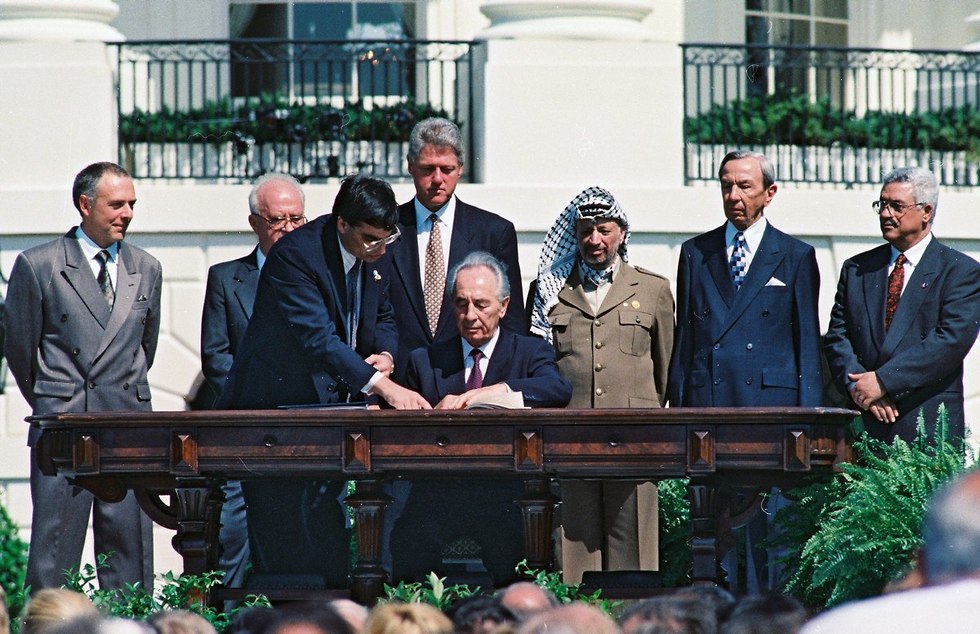A set of agreements signed between Israel and Palestinians 25 years ago contributed greatly to current reality and developments in region, but only because they were never fully implemented. For Israel—occupation became much cheaper, for Palestinians—international legitimacy was achieved.
Since the signing of the Oslo Accords 25 years ago and since the start of the occupation nearly 50 years ago, we can congratulate the signatories of the Oslo agreement on a current reality in the Palestinian territories, and not because the agreement was signed, but rather because it was never fully implemented, and although the Palestinian terror is mostly to blame for this failure, Israel has also played its part.
The Oslo agreement is not dead, it is alive and breathing. Although only the first articles were ever implemented, the reality it had created has benefitted Israel—the occupation of the territories became much cheaper.
The establishment of a political Palestinian entity exempted Israeli governments from a burden of sustaining the territories, not only when it comes to: economy, education, health, employment, infrastructure and welfare, but from the enormous security burden that only those who have been to Nablus, Jenin and Hebron before Oslo, would understand.

The security cooperation—the principles of which were outlined in Oslo—has been successfully maintained for the past 15 years to Israel’s delight, when the Palestinian Authority is actually demilitarized and has no tanks or planes, only rifles and pistols.
The finished version of the Oslo agreement did not harm Jerusalem, which remained unified, the right of return did not materialize, no borders were established in the eastern part of the country and the areas under a Palestinian control are reminiscent of enclaves.
As previously mentioned, the agreement freed Israel of its obligations when it comes to expenses and investments in the territories’ residents, not to mention the civil and military rule that would have only increased the friction with the local population and encouraged terror activity.
As far as the Right is concerned, the agreement did not interfere with a settlement enterprise. If there were construction delays in the territories, it was due to the international involvement, or more precisely, the American one.
The bottom line is that since Oslo there has been a fourfold increase in the number of settlers—at the time of the signing of the agreement, there were around 115,000 settlers in the territories, and today there are nearly 450,000.
The Right’s opposition to Oslo did not stem from its fear of terrorism, but rather from a fear of handing over to the Palestinians the territories that belong to the Land of Israel. The Right even used terrorism as an excuse to build settlements since it is “an appropriate Zionist response.”
The Oslo Accords gave certain advantages to the Palestinians as well. The agreement paved a way for the idea of a Palestinian state. The Palestinian entity is run as a state in every sense of the word—with a flag, an anthem, police and army forces and government apparatuses—and it does not cost the Israeli taxpayer a penny.

Equally important to the Palestinians is the international legitimacy they have received because of Oslo, and the embedding of an idea of the two-state solution—a consensus among the international community, including the Arab states.
However, since the latter stages of the agreement were never implemented, the Palestinians did not reach their national aspirations. Today they are disappointed, frustrated, hopeless and are awaiting the unknown.
Oslo created a hybrid reality in the territories: a Palestinian state in Area A, comprising 17.2 percent of the West Bank (972 square kilometers); Area C, under full Israeli control and constitutes 59 percent of the West Bank (1,344 square kilometers), and is being slowly annexed; and Area B, under joint Israeli-Palestinian control, which represents 24 percent of the West Bank (about 1,344 square kilometers).
The relations with the Palestinians in the West Bank are integrated when it comes to economy and infrastructure, including the water and electricity sectors.
The problem is that although the reality created by the Oslo Accords is convenient for the Israeli Right, it is dragging the two nations into a de facto binational state—a sure recipe for continuing violence and bloodshed, which only harms Israel as a Jewish, democratic and Zionist state.
If we were to entertain ourselves with an idea of “if” and imagine the Oslo agreement had been implemented in its entirety, Israel would have been a country with a Jewish majority that would not need a legislation such as the Nation-State Law, with recognized borders and open relations with the Arab world, and without the stain of occupation stamped on its forehead.
Most importantly, the word “peace” would have been part of our everyday discourse. Too bad that did not happen.
As reported by Ynetnews
